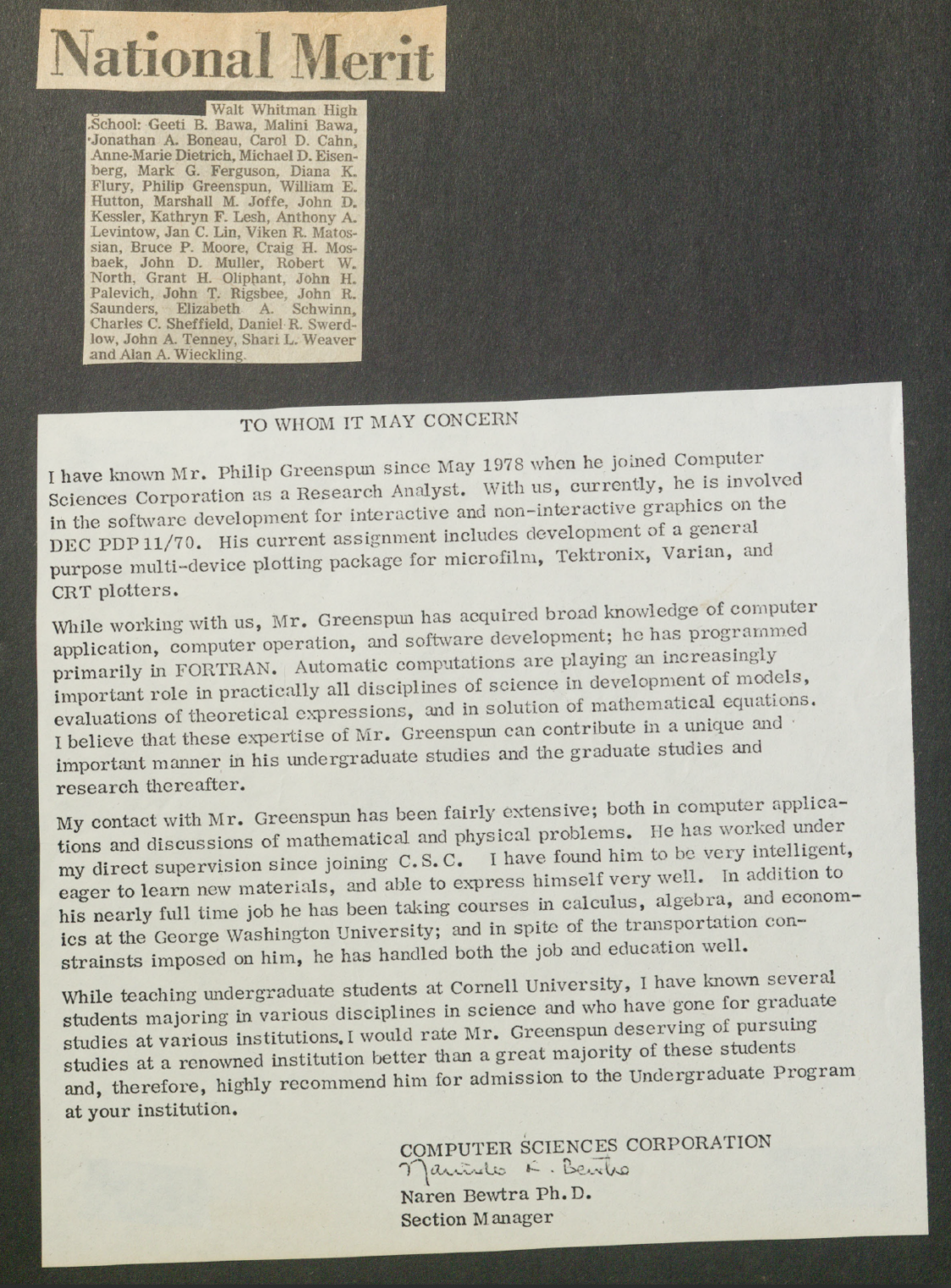We’re closing in on college application deadlines. One of the albums that my mom kept included a recommendation letter for my own application to MIT in 1979. I was working at NASA Goddard Space Flight Center on the Pioneer Venus project (specifically, data analysis for information streamed back from the Orbiter). Goddard was a two-tiered plantation where the elites were federal government civil service employees and the slaves were employed by contractors. In my case, the contractor that actually sent me paychecks was Computer Sciences Corporation, though I worked on site at NASA every day. My boss was Naren Bewtra, who was born in India and came to the U.S. to earn a physics Ph.D. at Cornell.
Here’s the album page:
Related:

I read a book on Fortran in the late ’70s, and first got a chance to use it in 1984 at a summer college program for high school students, “Scientific Computing”. I worked for a sailboat store as a high school student, much more fun IMO and I met cuter girls. A lot of the “codes” [sic] for linear algebra in supercomputing applications are still in Fortran 90. My first language was Basic, which I used to write a fantasy baseball prototype in when I was 14 on one of the first IBM PCs. I didn’t even apply to MIT, much less Caltech–I was dorky enough. I wish you were still working with us on interactive and non-interactive graphics, especially in Lisp, your creative ideas are needed. I’m the “embarrassment” (formerly the non-PC “black-sheep) of our family, so my mom didn’t keep records of my National Merit semifinalist accomplishment.
Wikipedia –
“Computer Sciences Corporation (CSC) was an American multinational corporation that provided information technology (IT) services and professional services. On April 3, 2017, it merged with the Enterprise Services line of business of HP Enterprise (formerly Electronic Data Systems) to create DXC Technology.”
@philg: “Goddard was a two-tiered plantation where the elites were federal government civil service employees and the slaves were employed by contractors. ”
1979 was long before paid 4-week+ furloughs for federal government worker elites.
Very solid letter but where is the section about your extensive struggle against repression by your relatively Privileged NASA colleagues, not to mention the adult GWU undergrads excluding and Marginalizing you (via wedgies, hazing, forced binge drinking, etc). Or your Native American roots (great aunt twice removed Elizabeth). Would being a mere youth rocket scientist (ok, rocket software engineer) cut it these days?
The whole of NASA as an organization has traditionally been sort of a “bureaucratic glue”, managing the contractors as a hierarchy, full of “Assistant Deputy Directors”. But really you weren’t a slave, or even a peon, since you were paid and not forced to work there. My capitalist-biased A.I. was reluctant, however, it did eventually compare NASA and the Soviet-style government, and found that NASA’s organization had similarities to the government of the U.S.S.R.–a purpose-built “shadow Soviet” to compete with them.
You really were more of a “rabochiy”, Phil, a heroic worker. People claim that NASA was a key in developing many innovative technologies. I would suggest what we needed here on Earth wasn’t exotic bio-incompatible materials and tech like mylar (for juice boxes!), doped silicon, and Tang, specialized to survive space; but rather materials that integrated with the terrestrial environment. NASA has produced a lot of valuable science–monetizing the artifacts could lead to a broken junk planet, which we will need to flee with rockets. Ask Musk, et al. I would have rather spent the money on sailboats and powered gliders than the folly of humanity in space. Or at least not rushing to capitalize on it (A.I. I’m looking at you) before we knew the effect on our planet.
A winding path from NASA to George Washington to MIT, all as an undergrad. Lions would have been ecstatic to get anything involving space, even 30 years after graduating. Suspect it was more common for undergrads to have gritty jobs like that 50 years ago, when NASA was more purpose driven. It’s just a pension fund now.
Can you see if my comment to Report from the trenches: The post-Trump de-woked Smithsonian (Vol II) was lost in your spam folder? It included two internal links which may have tripped your filter
Thanks, SN. That was tough to dig out from the spam! It’s Akismet, a WordPress plug-in, that does the AI magic.